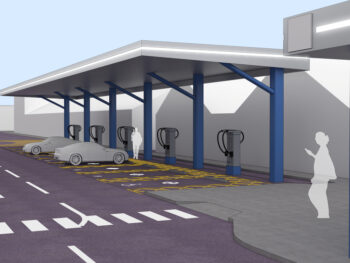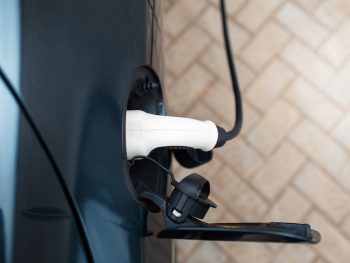Transport for London opens search for EV ultra-rapid charging hub partner
Places for London – Transport for London’s (TfL) property company – has launched a search for a joint venture partner to help deliver ultra-rapid charging hubs across its estate.

The partnership will deliver a number of off-street charging hubs, open to the public and able to charge multiple vehicles
The partnership will deliver a number of off-street charging hubs, open to the public and able to charge multiple vehicles.
Five sites across London will initially be offered to the joint venture, each with a minimum of six ultra-rapid charging bays, including at least one bay for those with accessibility needs, with the potential for more to be added in the future.
The ultra-rapid charging hubs will be located in Hanger Lane, Canning Town, Hillingdon Circus, Hatton Cross and Tottenham Hale. The hubs will support high-mileage drivers such as taxis, private hire vehicles, delivery drivers, sole traders, and local businesses to switch to electric vehicles. Hanger Lane in Ealing will host the largest site, with up to 20 rapid charging bays and retail facilities.
Places for London is looking for a partner with experience in the EV charging sector, such as designing and building EV charging hubs elsewhere in the UK and operating a portfolio of industry-leading charging points. It is open to interest from a consortium or a single entity.
The partnership will help support the Mayor of London’s commitment to achieve net zero carbon by 2030 and will build on existing work by TfL to grow the capital’s electric vehicle charging infrastructure while also helping generate revenue for reinvestment into London’s transport network.
The sites will also help support placemaking in the local areas by including retail and welfare facilities on some of the larger sites where possible.
Speaking this week at the London EV Show, Seb Dance, deputy mayor for transport, said: “London is leading by example, with over a third of all charge points in the UK installed in our city so far. The joint venture for ultra-rapid charging hubs announced today will make it even easier and more convenient for Londoners and local businesses to switch to electric vehicles. This will help build a better London for everyone – a city that is cleaner, greener, and healthier for all.”
London currently has around 1,000 rapid or ultra-rapid charging points, of which around 300 have been delivered by TfL.
As part of its Electric Vehicle Infrastructure Strategy, TfL’s modelling predicts that London will need around 4,000 rapid charge points by 2030 – and it’s looking at how to bring more of its own land into use for EV charging bays. TfL is also working with other members of the Greater London Authority (GLA) family and borough councils to bring further sites across London.
Electric car registrations in London outpace rest of the UK

The proportion of new electric cars registered in London surged to 23.2% in 2022
New data also reveals that new electric car registrations in London have outpaced the rest of the UK and diesel car registrations have declined sharply since 2018, helping to drive a cleaner, greener, and healthier future for London.
The Electric Vehicle Uptake in the UK and London report prepared by researchers with Air Quality Consultants reveals that the proportion of new electric cars registered in London has surged from 1.3% of all new car registrations in 2018 to 23.2% in 2022 – an average growth rate of 5.5% per year.
Growth was higher for inner London, rising from 2% in 2018 to 35.5% in 2022, an average rate of 8.4% per year. This is compared to 0.6 to 15.8% in the rest of the UK over the same period, an average rate of just 3.8% per year.
The uptake in electric cars has also been far faster in London than other cities in the UK, including Bristol (where there has been an average growth rate of 2.9% per year), Sheffield (2.5%), Birmingham (2%), and Manchester (1.8%), according to the report.
Meanwhile, registrations of diesel cars, which are a major contributor to air pollution, have decreased significantly in London. Diesel car registrations peaked in 2016 at 38.6% of new registrations, then sharply plunged to 4.6% in 2022. The report explains that this was likely due to wider public awareness of the toxic pollution produced by diesel vehicles, as well as the Ultra Low Emission Zone (ULEZ).
City Hall announces further Zest contracts

Two contracts for a further 51 sites for rapid charge points have now been signed and awarded to charge point operator Zest
City Hall has also signed two contracts for a further 51 sites for rapid charge points, which have been awarded to charge point operator Zest.
Announced by deputy mayor for transport Seb Dance this week at the London EV Show, the sites are being delivered as part of the mayor’s Electric Vehicle Infrastructure Delivery (EVID) project, which now has contracts with Zest in place to deliver over 100 rapid charging bays on the TfL road network. Installation of the EVID charge points will begin in early 2024.
Alex Williams, chief customer and strategy officer at Transport for London, said: “The Mayor’s Electric Vehicle Infrastructure Delivery (EVID) project will bring more than 100 new charging bays to the capital by making public land available, enabling the market to deliver this essential infrastructure. We are pleased to have awarded two further contracts as part of our EVID work to Zest. Zest is helping us bring more charging points to London’s drivers, giving them the confidence that wherever they travel in this city, a place to plug in will never be far away.”
Robin Heap, CEO of Zest, said: “Zest is investing in rapid charging infrastructure that will serve Londoners for decades. We are proud to be part of the mayor’s EVID project as it prepares the capital for the exponential growth in electric vehicles and delivers on decarbonisation and air quality. We provide what people want – a convenient and reliable charging service built to last.”
City HallEV charging hubsPlaces for LondonTransport for London (TfL)Zest












